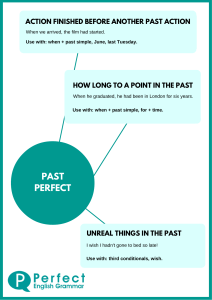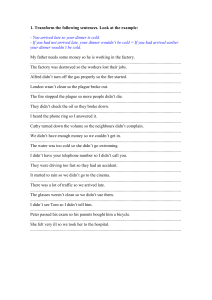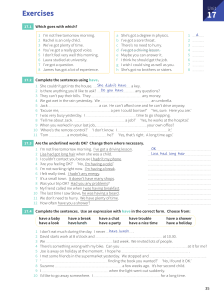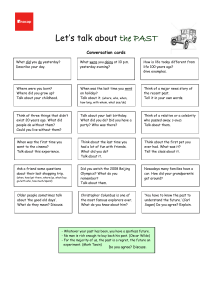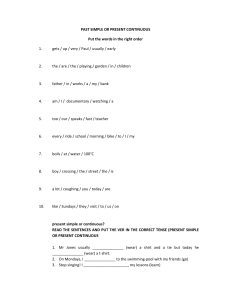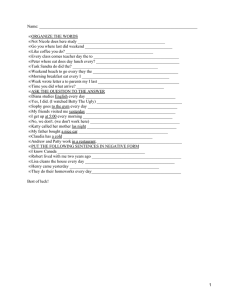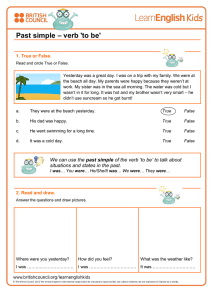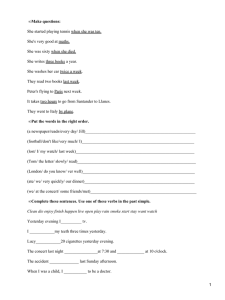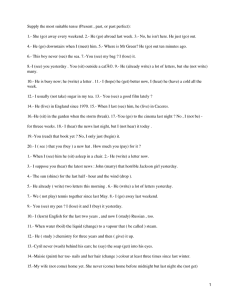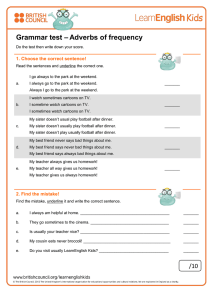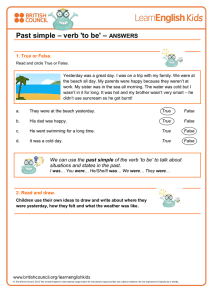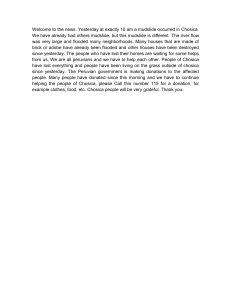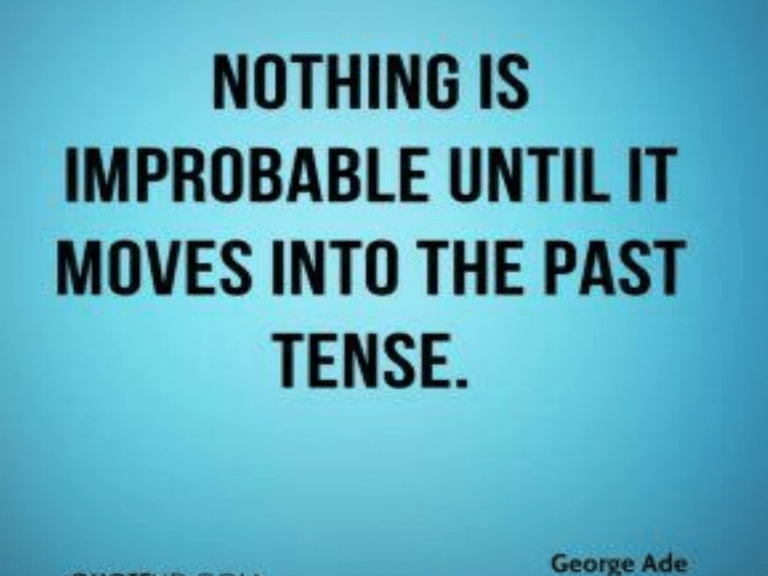
Form the form is the same for all persons POSITIVE: They arrived three weeks ago. – REGULAR He left at three o’clock. – IRREGULAR NEGATIVE: I didn’t play football yesterday I didn’t go home early on Saturday INTERROGATIVE: Yes/No questions: Did you play football yesterday? Did you go home early in Saturday? WH-question – When did you learn last time? Verb TO BE Positive sentences: I was in London last year Negative sentences: -They weren’t at home last weekend Yes/No questions: Were you ill yesterday? Use a finished action in the past We met in 2007. action that follow each other in a story Mary walked into the room and stopped a past situation or habit When I was a child, we lived in a small house by the sea. SIGNAL WORDS / TIME EXPRESSIONS - last night, ....... ago, yesterday, the other day, in 1999, when I was younger.... Form Was / were + verb + -ing They were driving to Paris. I was writing my English homework all afternoon. We weren’t waiting for a long time. What were they doing? Was your friend listening to the teacher? Use to express activities in progress before, and probably after, a particular time in the past At 7 0’clock this morning I was having my breakfast. for descriptions Jan looked beautiful. She was wearing a green dress. to express an interrupted past activity When the phone rang, I was having a shower. to express an incomplete activity I was reading a book during the flight. Past simple or continuous? Sometimes both tenses are possible. The Past Simple focuses on past actions as complete facts. The Past Continuous focuses on the duration of past activities Compare : A: I didn’t see you at the party last night. B: No. I stayed at home and watched the football. A: I didn’t see you at the party last night. B: No, I was watching the football at home. perfect means ‘ completed before ‘ the past perfect refers to an action in the past that was completed before another action in the past Form Had + past participle I had seen him before. You hadn’t finished work at six o’clock. Had you written your homework before you came here? What had you been before? Use to make clear that one action in the past happened before another action in the past this is the past in the past When I got home, I found that I had forgotten my books at the faculty. On the timeline had forgotten got had written went When I got home, I realized that I had forgotten my books at the faculty. I went for a walk after I had written the seminar paper, Past Simple and Past Perfect combined the Past Simple tells a story in chronological order Sue met Pete at university. They were together for 6 years. They divorced last month. the Past Perfect can be used to tell a story in a different order Sue and Pete divorced last month. They’d met at university, and had been together for six years Notice the difference between these sentences When I got to the party, Peter went home. ( = first I arrived, then Peter left ) When I got to the party, Peter had gone home. ( = first Peter left, then I arrived ) To talk about a past action that ended before another action or time in the past, we use BEFORE and AFTER in combination with the simple past The film HAD STARTED before we ARRIVED. We also use the past perfect to show the cause of a past action I WAS tired yesterday because I HADN’T SLEPT well the night before. With time expressions such as when, after, before, as soon as, by the time, by and until By the time I GOT home, my mother HAD already PREPARED dinner. Match the sentence with the tense: a) Past Perfect Simple, b) Past Simple, c) Past Continuous I did the week’s grocery shopping on my home computer.____ I hadn’t been to that party of town before._____ Why were you running down the street?_____ Exercise: My brother _________ (get) married last year. We __________ (have) dinner when Sally called. John got to the cinema late and the film ________(start) when he arrived. I was driving home when the accident __________. (happen) ____________(you / watch) TV when I phoned? I'd studied really hard but I_________(not pass) the exam. Exercise key: My brother got married last year. We were having dinner when Sally called. John got to the cinema late and the film had started when he arrived. I was driving home when the accident happened. Were you watching TV when I phoned? I'd studied really hard but I didn’t pass the exam.
